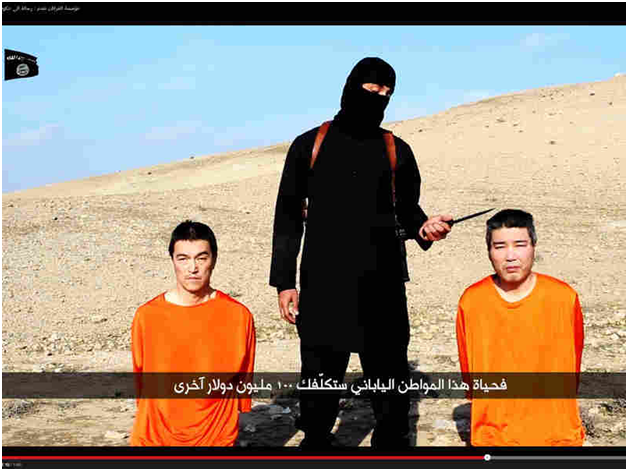Islamic State Kills One of the Two Japanese Hostages
A grab from the earlier Islamic State video showing a militant with the two Japanese hostages, one o

NEW DELHI: The Islamic State has has killed one of the two Japanese hostages Haruna Yukawa. It has released a video of the execution.
Japan's prime minister has condemned this as "outrageous and unacceptable".
Shinzo Abe has demanded the release of a second hostage, Kenji Goto,also shown in the video. Japan says it is trying to verify the footage.
Goto appears on the video to say IS would swap him for Sajida al-Rishawi - an Iraqi militant held in Jordan.
"This act of terrorism is an outrageous and unacceptable act of violence," Abe said following the video of the execution that has sent shock waves across Japan and the world..
"I again strongly demand the immediate release of Mr Kenji Goto unharmed."
In a statement, President Barack Obama said the US "strongly condemns the brutal murder of Japanese citizen Haruna Yukawa by the terrorist group ISIL [or IS]".
Mr Obama said the US would stand "shoulder to shoulder'' with Japan.
The video shows Goto holding a picture of what appears to be the body of Mr Yukawa.
US National Security Council official Patrick Ventrell said the US was also trying to establish the authenticity of the video and was closely co-or
As the deadline for the execution of the two Japanese captives being held by Islamic State militants had approached Abe had on Tuesday condemned the threat. Speaking in Jerusalem, Abe said that the $200 million in aid promised to countries battling the Islamic State will be honoured. "This posture will not change at all… The international community will not give in to terrorism and we have to make sure that we work together."
Abe was referring to the video that had emerged a day earlier at the time, that showed two Japanese men in orange jumpsuits, believed to be hostages Kenji Goto Jogo and Haruna Yukawa, and a knife-wielding militant dressed in black. In the video, the militant demands $200 million from the Japanese government within a period of 72 hours in exchange for the two captives.
The Japanese government responded by saying it will not give in to terrorism. "Our country's stance -- contributing to the fight against terrorism without giving in -- remains unchanged," chief government spokesperson Yoshihide Suga told a news conference in Tokyo. "The video contains threats to murder two people who appear to be Japanese nationals," Suga said. "We are checking if it's credible...Taking people hostage is unforgivable and I feel strong anger,” the spokesperson continued.
The Islamic State has a number of foreign hostages, of which American aid worker Peter Kassig, US journalists James Foley and Steven Sotloff, and British aid workers David Haines and Alan Henning have been the most prominent executions. These executions were recorded -- the men all dressed in orange jumpsuits -- and released by the Islamic State accompanied by messages directed to the UK and US for their role in bombing the militant group in Iraq and Syria.
Another prominent hostage, Briton John Cantlie, has made numerous video appearances by has not been executed. Instead, Cantlie has appeared in eight videos, the latest being a documentary style video released earlier this month in which Cantlie visits a marketplace, a hospital and a police station and claims that life in Mosul, contrary to western reports that depict the city as decrepit, is stable.
Although the hostages from the UK and US, barring Cantlie, seem to be lined up for execution, a number of hostages from a host of countries have reportedly been securely released on the payment of ransom money. The countries involved however have not confirmed the terms of exchange.
Released hostages include Greta Ramelli and Vanessa Marzullo -- two Italian aid workers who returned home last week after being held hostage in Syria for over five months. Javier Espinosa, Ricardo Garcia Vilanova and Marc Marginedas, three spanish journalists, were released last march. French journalists Edouard Elias, Didier Francois, Nicolas Henin and Perre Torres were released in April last year after being held for ten months. Nicolas Hammarstrom and Magnus Falkehed, Swedish freelance journalists, were released early January. The Swedish government declined to comment on how they were set free.
Several others, however, are believed to still be being held hostage by the militants. This includes a Jordanian pilot, Mu’at Al-Kaseasbeh whose F-16 went down near Islamic State stronghold Raqqa in northeastern Syria in December last year. Images have emerged reportedly showing Islamic State militants with the captured pilot but the group has thus far made no public demand for his release.
The group reportedly also holds captive Father Paolo Dall’Oglio, an Italian Jesuit priest who traveled to Syria and went missing in July 2013. An unidentified American aid worker and three workers for the International Committee of the Red Cross are also being held by the Islamic State militants. Their identities have not been revealed by the US and the Red Cross because of fear for their safety.



